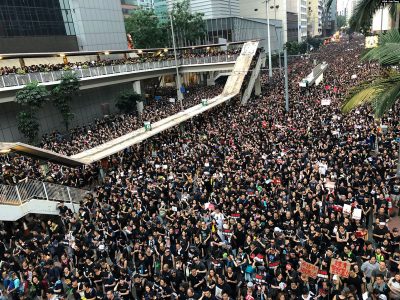
Hong Kong activist groups hosted a screening Sunday of “Head-To-Tail,” a drama that focuses on Hong Kong’s 2014 Umbrella Movement Protests, which was followed by a panel that discussed both the film and the ongoing protests in Hong Kong.
The film, directed by Hong Kong filmmaker Luther Ng, depicts the effects of Hong Kong’s 2014 Umbrella Movement protest on the Suens, a Hong Kong family caught in the tumult of the protests.
Sai Hoi, the father in the Suen family, is a journalist who wants to maintain his neutrality during the social upheaval and violence in the city. His children, however, are caught on either side of the conflict.
While his daughter is a hot-headed social activist pushing for greater democracy in Hong Kong, his son is a stoic police officer trying to keep order within the city. The rising insurgent movement strains the family’s relationships as tensions rise among journalists, activists and police in Hong Kong.
A panel discussion and Q&A were held after the screening, where speakers discussed the differing experiences and perspectives of the various groups involved in the Hong Kong protests.
Held in Austin Hall at Harvard Law School, the screening was free and open to the public. The event was co-organized by Harvard University’s Asian Pacific American Law Students Association, MIT’s Hong Kong Student Society and local Hong Kong activist Frances Hui.
Hui, a fourth-year journalism and political science student at Emerson College, moderated the panel.
Panelists included Barbara Marcolini, a video producer on The New York Times’ Visual Investigations team as well as former Royal Hong Kong Police officer John Chow. Nathan K. C. Law, a leader in the Umbrella Movement and Hong Kong’s youngest elected lawmaker, also spoke in the panel.
Law said protesters and supporters have accused Hong Kong police of brutality and condemned them for their use of excessive force.
“A lot of our fellows died during the movement,” Law said. “Some lost their eyes and suffered from huge damage and injuries.”
Marcolini, who covered the events in Hong Kong this summer for The Times, said during the panel her most significant memory was witnessing acts of police misconduct and brutality on Aug. 11, which would become one of the bloodiest days in this year’s protest.
Marcolini said she remembered undercover Hong Kong police officers beat and arrested protestors hours after demonstrations for the day had ended.
“We had protestors with a brain injury, broken bones and broken teeth,” Marcolini said. “You see the increase of the violence and the seriousness of these injuries.”
“Head-To-Tail” illustrated the deterioration of the Suen family as a result of their respective roles in the protests. Panelists were asked whether relationships between protestors and police in Hong Kong could be salvaged, to which Marcolini responded that in doubt.
“I spoke with many Hong Kongers and most of them told me that they lost trust in police and the only way that they can trust the police again is if the police force acknowledges the misconduct that has happened and investigates their actions,” Marcolini said.
The Umbrella Movement began as a student protest late 2014 advocating for the full universal suffrage promised in Hong Kong’s constitution. Tens of thousands of pro-democracy demonstrators occupied the streets of Hong Kong’s Admiralty district, where clashes between demonstrators and police quickly turned violent.
The clashes continued for months until police dispelled the protesters in December 2014.
In early 2019, thousands again took to the streets in a new wave of mass protests — this time after Hong Kong Chief Executive Carrie Lam proposed a bill that would allow the city to extradite fugitives to mainland China.
Lam formally withdrew the bill after months of insisting the contrary, but the protests continue to this day as the movement evolved to call for greater democracy within Hong Kong.
Rudy Gabardi, a second-year student at Bunker Hill Community College, said he thought the film provided enlightening information to those who were not familiar with the Umbrella Movement. Gabardi said the movie portrayed a concept he spoke up about during the panel: “there is no such thing as an ethical police officer.”
“The female character in the film had this idea that she can protect the rights of the protesters but that becomes inherently impossible,” Gabardi said. “Because people believe that the job of police is to protect and serve the citizens, but really the job of police is to maintain societal control and passivity of the populace.”
Cambridge resident Ian Chong, 43, said the combination of police action and government action has contributed to greater cleavages in trust between the people and their government.
“Why I put the onus on the local police and the state is because they are the ones who have authority, so it’s easier and less costly for them to take initiative,” Chong said. “So the fact that they don’t as well as the fact that bad things happen, ultimately, that’s why you’re in political office. You take responsibility.”
Wei Zhong Goh, a fourth-year doctoral candidate at Boston University’s School of Medicine, said he feels the event was a good opportunity for more Americans to develop an understanding of what Hong Kong is protesting for.
“The abuses that are happening in Hong Kong, it needs to be like a global issue,” Goh said. “American support is needed to pass the Hong Kong Human Rights and Democracy Act, get the president to sign it. Since America is a democracy, the people’s support is important, so this helps do that.”
Before leaving Harvard, Law mingled with attendees, shaking hands, answering questions and passing out business cards.
“Many Hongkongers live in Boston and they’re mobilized and doing all sorts of campaigns in support of Hong Kong,” Law said. “That’s already an encouragement to protesters on the ground in Hong Kong. It lets them know that even though they’re overseas, they’re not alone.”






















































































































